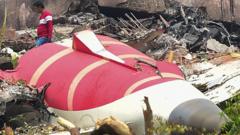The London-bound Boeing 787-8 Dreamliner crash transpired shortly after takeoff from Ahmedabad airport in western India. Although reports earlier suggested that the black boxes would be sent overseas for analysis, the Ministry of Civil Aviation has clarified that a definitive decision has not been reached. The AAIB emphasizes that any potential location for the analysis will be determined after assessing various technical, safety, and security factors.
Both sets of Enhanced Airborne Flight Recorders (EAFRs), known as black boxes, have been recovered, with investigators finding them on June 13 and June 16. These vital devices record crucial flight and cockpit information, aiding in piecing together the flight's final moments and uncovering the incident's cause. However, concerns have emerged regarding potential damage to the recorders due to a post-crash fire, leading to speculations about sending them to the U.S. for analysis where conditions may favor data extraction.
Former accident investigator Captain Kishore Chinta suggested that one set of recorders could be sent to the U.S. for cross-validation of the data, noting that the new AAIB lab, opened in April, may not yet be fully operational for downloading EAFR data.
In related news, N Chandrasekaran, Air India's chairman, revealed that one of the engines in the crashed aircraft had a new status, while the other wasn't scheduled for maintenance until December. Both engines had previously been recorded as having "clean" operational histories.
Following the incident, India's aviation regulator mandated supplementary safety inspections on Air India's fleet of Boeing 787 jets. As a precautionary measure, the airline announced a reduction of flights on 16 international routes and a suspension on three international destinations between June 21 and July 15 to accommodate enhanced pre-flight safety protocols and address extended flight durations due to airspace restrictions in the Middle East.
Both sets of Enhanced Airborne Flight Recorders (EAFRs), known as black boxes, have been recovered, with investigators finding them on June 13 and June 16. These vital devices record crucial flight and cockpit information, aiding in piecing together the flight's final moments and uncovering the incident's cause. However, concerns have emerged regarding potential damage to the recorders due to a post-crash fire, leading to speculations about sending them to the U.S. for analysis where conditions may favor data extraction.
Former accident investigator Captain Kishore Chinta suggested that one set of recorders could be sent to the U.S. for cross-validation of the data, noting that the new AAIB lab, opened in April, may not yet be fully operational for downloading EAFR data.
In related news, N Chandrasekaran, Air India's chairman, revealed that one of the engines in the crashed aircraft had a new status, while the other wasn't scheduled for maintenance until December. Both engines had previously been recorded as having "clean" operational histories.
Following the incident, India's aviation regulator mandated supplementary safety inspections on Air India's fleet of Boeing 787 jets. As a precautionary measure, the airline announced a reduction of flights on 16 international routes and a suspension on three international destinations between June 21 and July 15 to accommodate enhanced pre-flight safety protocols and address extended flight durations due to airspace restrictions in the Middle East.




















